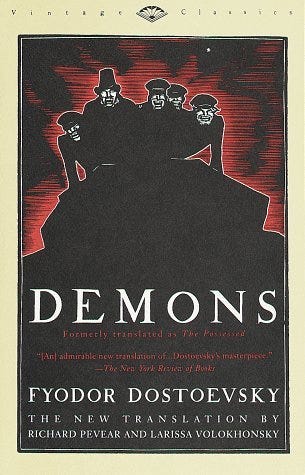Its interesting to me, the similarities to our modern moment, that a book published before the great depression has a central thesis accusing a modern intellectual class of abandoning its historic role of representing justice, fairness, liberty, and freedom of inquiry. And of substituting its former adherence to timeless principles for fealty to a utopian ideology.
"La Trahison des Clercs" (The Treason of the Intellectuals) was published in 1927 by the French philosopher Julien Benda.
Political philosopher John Gray has written about the pattern of cultural convulsion, like our experience today, as something reoccurring for millennia. But The Treason Of The Intellectuals points out the difference with the convulsions of the 19th century were, for the first time, markedly political in nature. Surprising, as politics was a much smaller part of typical French bourgeois life during the late Middle Ages and Renaissance.
Benda writes:
“This is the age of politics. ‘Political passion’ has become entwined with our lives like never before. This translates into fanatical advocacy on behalf of race, class, and nation. One would be hard pressed to find, in all of history, an age in which masses of people have become agitated to such an extent for these causes.”
Race, class, and nation. He could just as easily be describing today. The similarities go deeper:
"I see over the course of history an uninterrupted procession of philosophers, religious thinkers, writers, artists, scientists...among whom the trend is a formal opposition to the realism of the multitudes...Thanks to them one can say that, for two thousand years, humanity did bad but honored good. This contradiction was the glory of the human species and constituted the crevice into which civilization could slide. However, at the end of the 19th century, a critical shift occurred: The intellectuals occupied themselves with the game of political passions; those who had been a brake on the realism of peoples made themselves into its stimulant."
Benda describes their “political passions” as “Marxist hocus-pocus” a submission of rational thought to mysticism. Traditional intellectual methods and processes demoted in favor of political activism.
This is the turn (turning point) of interest for me. If Julien Benda is right, this is the moment we got political!
Sharing many axiomatic equivalents to Marxian principles, the woke movement of today evangelizes a polylogism or “hocus-pocus” incommensurate with the rigorous and passionless standards of western empirical processes and scientific methods. An inability to use common logic to make convincing arguments for rushing in a utopian ideology through revolution is part of the reoccurring pattern, along with the ever-present Marxist apologetics.
There is a deep history to the culture issues of today. Wokeism did not come out of nowhere. This moment can be described not only as a treason of the intellectuals (Universities is where it started) but a spill-over of the same ideologically driven treason of western values into virtually all Corporate Organizations (including Legacy Media and Big Tech) and Government.
Dostoevsky’s Demons, written 60 years before The Treason Of The Intellectuals, chronicles the tragic and farcical process by which progressives discredited traditional institutions and unleashed a wave of revolutionary chaos in a fictional 1860’s Russian town.
Responding to the prevalence of political and moral nihilism of the time, Dostoevsky presents Demons in allegorical form warning of the potentially devastating consequences of extreme revolutionary rejection of tradition and objectivity.
Our problems are not new. These are just two books that illustrate similar struggles along similar ideological lines going further back in time than the 1960s Universities where Critical Theorists and Post Modernists are most often blamed as the source of our Woke culture wars. The rot I’m afraid goes much further back.






Very glad to have found your writing. Have you also read Jacques Ellul’s ‘The New Demons’? Chapter VI ‘Secular Religions: Political Religion’ resonates with your mention of;
“political passions” as “Marxist hocus-pocus” a submission of rational thought to mysticism
‘Hegel and the Hermetic Tradition’ (G.A.Magee) is also a deep dive into the gnostic underpinnings of (as you rightly say) the rot going much further back. I’ve enjoyed the output of New Discourses & Sovereign Nations in attempting to understand the culture shock I experienced working only on the periphery of Canadian Ed system (having worked over 25 yrs in the UK). Hypernormalization is the air breathed here and it’s been impossible to find any intellectual kin who value traditional pedagogy & content. Great to find a Canadian voice. I’ll be binging on your articles now to catch up. Wish I knew people in my locale who resonated similarly.